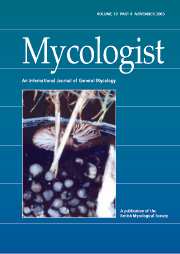Crossref Citations
This article has been cited by the following publications. This list is generated based on data provided by
Crossref.
Maubon, D.
Park, S.
Tanguy, M.
Huerre, M.
Schmitt, C.
Prévost, M.C.
Perlin, D.S.
Latgé, J.P.
and
Beauvais, A.
2006.
AGS3, an α(1–3)glucan synthase gene family member of Aspergillus fumigatus, modulates mycelium growth in the lung of experimentally infected mice.
Fungal Genetics and Biology,
Vol. 43,
Issue. 5,
p.
366.
Latgé, Jean-Paul
and
Beauvais, Anne
2007.
Immunology of Fungal Infections.
p.
331.
Beauvais, Anne
Perlin, David S.
and
Latgé, Jean Paul
2007.
Fungi in the Environment.
p.
269.
Beauvais, Anne
Schmidt, Christine
Guadagnini, Stéphanie
Roux, Pascal
Perret, Emmanuelle
Henry, Christine
Paris, Sophie
Mallet, Adeline
Prévost, Marie-Christine
and
Latgé, Jean Paul
2007.
An extracellular matrix glues together the aerial-grown hyphae of Aspergillus fumigatus.
Cellular Microbiology,
Vol. 9,
Issue. 6,
p.
1588.
Alvarez-Perez, Sergio
Garcia, Marta E.
Bouza, Emilio
Pelaez, Teresa
and
Blanco, Jose L.
2009.
Characterization of multiple isolates ofAspergillus fumigatusfrom patients: genotype, mating type and invasiveness.
Medical Mycology,
Vol. 47,
Issue. 6,
p.
601.
Duarte-Escalante, Esperanza
Zúñiga, Gerardo
Nava Ramírez, Oscar
Córdoba, Susana
Refojo, Nicolás
Arenas, Roberto
Delhaes, Laurence
and
Reyes-Montes, María del Rocío
2009.
Population structure and diversity of the pathogenic fungus Aspergillus fumigatus isolated from different sources and geographic origins.
Memórias do Instituto Oswaldo Cruz,
Vol. 104,
Issue. 3,
p.
427.
Cabral, João P.S.
2010.
Can we use indoor fungi as bioindicators of indoor air quality? Historical perspectives and open questions.
Science of The Total Environment,
Vol. 408,
Issue. 20,
p.
4285.
Alvarez-Perez, Sergio
Mateos, Ana
Dominguez, Lucas
Martinez-Nevado, Eva
Blanco, Jose L.
and
Garcia, Marta E.
2010.
Polyclonal Aspergillus fumigatus infection in captive penguins.
Veterinary Microbiology,
Vol. 144,
Issue. 3-4,
p.
444.
Frías-De León, María Guadalupe
Zavala-Ramírez, Monserrat
Córdoba, Susana
Zúñiga, Gerardo
Duarte-Escalante, Esperanza
Pérez-Torres, Armando
Zepeda-Rodríguez, Armando
López-Martínez, Irma
Buitrago, María José
and
del Rocío Reyes-Montes, María
2011.
Phenotypic characteristics of isolates of Aspergillus section Fumigatifrom different geographic origins and their relationships with genotypic characteristics.
BMC Infectious Diseases,
Vol. 11,
Issue. 1,
Marfenina, O. E.
Fomicheva, G. M.
Gorlenko, M. V.
and
Svirida, N. M.
2013.
Ecophysiological differences between saprotrophic and clinical strains of the microscopic fungus Aspergillus sydowii (Bainier & Sartory) Thom & Church.
Microbiology,
Vol. 82,
Issue. 1,
p.
85.
Kubitschek-Barreira, Paula H.
Curty, Nathalia
Neves, Gabriela W.P.
Gil, Concha
and
Lopes-Bezerra, Leila M.
2013.
Differential proteomic analysis of Aspergillus fumigatus morphotypes reveals putative drug targets.
Journal of Proteomics,
Vol. 78,
Issue. ,
p.
522.
Kumar, Awanit
and
Shukla, P.K.
2015.
A monoclonal antibody against glycoproteins of Aspergillus fumigatus shows anti-adhesive potential.
Microbial Pathogenesis,
Vol. 79,
Issue. ,
p.
24.
Egbuta, Mary
Mwanza, Mulunda
and
Babalola, Olubukola
2017.
Health Risks Associated with Exposure to Filamentous Fungi.
International Journal of Environmental Research and Public Health,
Vol. 14,
Issue. 7,
p.
719.
Maghrabi, Firas
and
Denning, David W.
2017.
The Management of Chronic Pulmonary Aspergillosis: The UK National Aspergillosis Centre Approach.
Current Fungal Infection Reports,
Vol. 11,
Issue. 4,
p.
242.
Piguillem, Sofía V.
Ortega, Francisco G.
Raba, Julio
Messina, Germán A.
and
Fernández-Baldo, Martín A.
2018.
Development of a nanostructured electrochemical immunosensor applied to the early detection of invasive aspergillosis.
Microchemical Journal,
Vol. 139,
Issue. ,
p.
394.
Guerra, Felipe Q.S.
Araújo, Rodrigo S.A.
Sousa, Janiere P.
Silva, Viviane A.
Pereira, Fillipe O.
Mendonça-Junior, Francisco J.B.
Barbosa-Filho, José M.
Pereira, Julio Abrantes
and
Lima, Edeltrudes O.
2018.
A new coumarin derivative, 4-acetatecoumarin, with antifungal activity and association study against Aspergillus spp..
Brazilian Journal of Microbiology,
Vol. 49,
Issue. 2,
p.
407.
Złotko, Katarzyna
Wiater, Adrian
Waśko, Adam
Pleszczyńska, Małgorzata
Paduch, Roman
Jaroszuk-Ściseł, Jolanta
and
Bieganowski, Andrzej
2019.
A Report on Fungal (1→3)-α-d-glucans: Properties, Functions and Application.
Molecules,
Vol. 24,
Issue. 21,
p.
3972.
Pesca, C.
Cruciani, D.
Agostini, L.
Rossi, E.
Pavone, S.
Stazi, M.
Mangili, P.
and
Crotti, S.
2020.
Simultaneous detection of Aspergillus nidulans, Aspergillus luchuensis and Lichtheimia sp. in a bovine abortion.
Journal de Mycologie Médicale,
Vol. 30,
Issue. 1,
p.
100923.
Kumari, Amrita
Tripathi, Ankita H.
Gautam, Poonam
Gahtori, Rekha
Pande, Amit
Singh, Yogendra
Madan, Taruna
and
Upadhyay, Santosh K.
2021.
Adhesins in the virulence of opportunistic fungal pathogens of human.
Mycology,
Vol. 12,
Issue. 4,
p.
296.
Menu, Estelle
Filori, Quentin
Dufour, Jean-Charles
Ranque, Stéphane
and
L’Ollivier, Coralie
2023.
A Repertoire of Clinical Non-Dermatophytes Moulds.
Journal of Fungi,
Vol. 9,
Issue. 4,
p.
433.


